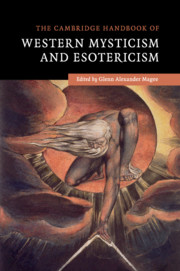Book contents
- Frontmatter
- Dedication
- Contents
- Acknowledgments
- Editor's Introduction
- List of contributors
- I ANTIQUITY
- 1 Ancient Mysteries
- 2 Pythagoras and Pythagoreanism
- 3 Parmenides and Empedocles
- 4 Plato, Plotinus, and Neoplatonism
- 5 Hermetism and Gnosticism
- 6 Early Jewish Mysticism
- 7 Early Christian Mysticism
- II THE MIDDLE AGES
- III THE RENAISSANCE AND EARLY MODERNITY
- IV THE NINETEENTH CENTURY AND BEYOND
- V COMMON THREADS
- Suggestions for Further Reading
- Index
- References
5 - Hermetism and Gnosticism
from I - ANTIQUITY
Published online by Cambridge University Press: 05 May 2016
- Frontmatter
- Dedication
- Contents
- Acknowledgments
- Editor's Introduction
- List of contributors
- I ANTIQUITY
- 1 Ancient Mysteries
- 2 Pythagoras and Pythagoreanism
- 3 Parmenides and Empedocles
- 4 Plato, Plotinus, and Neoplatonism
- 5 Hermetism and Gnosticism
- 6 Early Jewish Mysticism
- 7 Early Christian Mysticism
- II THE MIDDLE AGES
- III THE RENAISSANCE AND EARLY MODERNITY
- IV THE NINETEENTH CENTURY AND BEYOND
- V COMMON THREADS
- Suggestions for Further Reading
- Index
- References
Summary
Introduction
The religious currents that are usually called Hermetism and Gnosticism flourished in the Greco-Roman world of the first centuries of our era, but their impact on Western culture is still being felt today. Both proclaimed a salvific spiritual knowledge (gnosis) about God, the world, and man meant only for an elite (i.e., those who were worthy of receiving it). Accordingly, both currents showed distinct esoteric features, but that did not prevent their adherents from writing numerous books propagating these ideas. Although their views on the origin and destiny of human beings have much in common, there are also considerable differences, especially regarding the nature of the material world and the manner of salvation. To a certain extent, Gnosticism shows a radicalization of ideas that are also present, though not dominant or structural, in Hermetism.
Hermetism
Late Antiquity left us an extensive literature attributed to Hermes Trismegistus. It consists of magical, astrological, and alchemical texts (the so-called technical or practical Hermetica) and philosophically inspired religious treatises (the philosophical Hermetica). In the Greek world, Hermes Trismegistus was considered a sage of the remote Egyptian past, but originally he was the Egyptian god Thoth, the god of writing, culture, cosmic order, and magic. Already in the fifth century BCE, the Greeks identified Thoth with their god Hermes, who faintly resembled the Egyptian god. The predicate “Trismegistus” (“Thrice-Great”) derived from the Egyptian manner of expressing the superlative “greatest,” by repeating the word “great” three times.
There is no reason to assume that the technical and philosophical Hermetica once belonged together as successive parts of one great hermetic teaching program. But the adepts of religious-philosophical Hermetism had no objections to making use of magical practices and astrological calculations. The main sources for our knowledge of Hermetism are the following:
1. The Greek Corpus Hermeticum (= CH), a collection of seventeen treatises, of which CH I (Poimandres) and XIII (On Rebirth) are the most interesting.
2. The Latin Asclepius, the only complete hermetic text that was known during the Middle Ages. Some fragments of the Greek original have been preserved in later authors, and its final hymn is known from a Greek magical Papyrus. There are also Coptic translations of chapters 21–29 and of the final hymn, found in Nag Hammadi Codex (= NHC) VI.
- Type
- Chapter
- Information
- Publisher: Cambridge University PressPrint publication year: 2016

